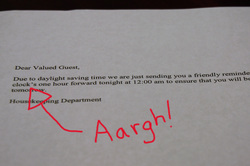
'Editors also know that the people who are really readers want to read. They hunger to read. They will forgive a vast number of clumsinesses and scamped work of every sort if the author will delight them just enough to keep them able to continue.'
-William Sloane
We all labor over our manuscripts with great care and diligence. We become captivated by our charactors and creatures; the tale we have conceived and given birth to; the story we have nurtured and developed and poured countless hours of our lives into. When it's finally done, and we have shed our tears of joy and sadness, we prepare to send it out into the world. But before we reach for that envelope - or in todays world, the submit button - we should all take a moment to stop and be sure we have done all we can to give our work the best possible chance of success when it must ultimately stand on its own.
I think we all fear that moment when our work leaves our hands, venturing out to find out if it can stand alone or not. In completing the manuscript, we complete a chapter of our writing lives.
Seven Circles is complete - almost. While it is for all practical purposes done, I can't help but feel it's just not finished. I can't put my finger on just what it is about the manuscript that is bothering me, I also can't get over the feeling that something about it is not quite right.
I wonder if it's just pre-submittal butterflies, or something real and substantial. While I dread doing yet another editing pass, I'm not comfortable submitting something that is sub-par in quality. It's the perfectionist curse I carry around within me. Or maybe it's just the writer in me fearing the possible rejection letter. Either way I'm in a vicious avoidance circle with my inner writer. It's frustrating as hell and I have got to break it soon.
So will I break down and send it out, or will I give in and open it back up?
Your guess is as good as mine at this point. I'll keep you updated.

“Insanity is relative. It depends on who has who locked in what cage. ”
― Ray Bradbury
It’s been a while since I posted anything and I had a bit of time tonight, so here I am. Posting.
Insanity. I think many writers face it from time to time. I know I do. Life in general drives a person to it. It my case family contributes, along with my personal muse: Chaos.
I’ve been away for awhile doing edits on “Seven Circles”. My Beta Readers or Designated Readers, have all chimed in and I’ve collected all of their comments. A HUGE thank you! To those who have helped – you know who you are. I couldn’t have done it without you! I’ve been doing some re-writes -clarifying plot points, character motives and setting details. It’s been time consuming and attention consuming. Staying focused has been important. I’m just about done now and the results are a story I’m extremely proud of.
So with the near completion of edits, I’ve begun the search for an agent, and started working on my query letter. After all the time I’ve put into writing the novel and polishing it, I’m not taking any chances with this aspect of the process. I’ve been doing my research and a good bit of reading to be sure the agents I select are appropriate and that I tailor my queries to the
right people.
What else am I up to? Well, I have plans to attend a writing conference in August, and I’m looking into some online workshops. Anything that will help me improve my craft. I’ve been holed up writing for almost two months now and I’m looking forward to the next step. Insanity is an adventure. This one promises to be an exciting one.

The reader has certain rights. He bought your story. Think of this as an implicit contract. He's entitled to be entertained, instructed, amused; maybe all three. If he quits in the middle, or puts the book down feeling his time has been wasted, you're in violation.
-Larry Niven
I’ve completed my final draft of my second Fantasy Novel. I use the word “Final” here with complete knowledge that I am nowhere near done by any means. Final, in this instance, means it’s as far as I can take it on my own.
Now the next step is submitting it to my critique group and soliciting for Dedicated Readers. With any luck, I’ll receive two or three brutally honest critiques and I’ll finally get to the bottom of what is really left on the pages.
I know this story still has flaws. It was conceived in my mind, took shape there, and was defined there. While I’ve done what I can to identify and correct as many of these flaws as I possibly could, the ones that remain are difficult for me to see. When I look, I see the whole story. Not just the parts that appear on the pages. I see the parts that were thought but never written; I see the parts that were written but later removed; I see the alternate events that never took place, as well as all the possible variation of the ones that ultimately did end up on paper.
It’s difficult to step away and see only what’s left.
While a small part of me dreads this step in the process, a larger part is looking forward to it. I know I can’t complete this story until I gain this outside perspective. Maybe there are writers who do it all totally by themselves; writer who can see their shortcomings without outside eyes. But as of right now I know that I’m not one of them. I don’t kid myself.
While these Dedicated Readers will be volunteering to help me (I hope), I still feel I have a responsibility to them. They are paying me to read my story. Not with money, but with their time and efforts. When they are done, I do not want them to feel like either have been wasted.
With that in mind, I’ve put a great deal of effort into cleaning the manuscript up for its first presentation: I’ve triple checked the spelling; read through twice for grammar; followed a timeline to be sure event lines are accurate; read dialogue out loud to be sure it works well; did a line by line edit to check punctuation and word usage. But most importantly, I’ve done my best to write an entertaining and exciting story.
Despite all my efforts, I know it’s likely still riddled with flaws and mistakes. It’s just over 80,000 words. The odds that I have found and fixed every mistake are just not likely. But, I’ll be sending it out knowing that I’ve done everything I could to minimize them. After all, I’m asking for story help with a novel, not help with a ninth grade English paper. My mechanics had better be the best I can make them or I have bigger issues than plot holes.
In the end, I’m ultimately looking for the truth about things like: How solid is the beginning hook; do the characters seem 3-dimensional; do the individual motives feel realistic and believable; are the events choreographed well, giving clear images to the reader; is the pace too slow or too fast in places and if so, where; etc..
As I said, I see too much when I read this story. I can’t always tell if I’ve created enough anticipation in the reader when I already know what’s going to happen and how things ultimately end.
So, I wish me luck in the weeks ahead as my beautiful masterpiece goes under the knife. Whether it turns out to be a minor procedure or a major surgery, I know it’s going to be a painful operation. I’m hopeful for the best, but I’m preparing for the worst. In the end though, I have no doubt I will make a full recovery. With any luck my manuscript will as well.

"When something can be read without effort, great effort has gone into its writing."
- Enrique Jardiel Poncela
As a beginning writer, I found that my biggest struggle was with the mechanics of writing well. Before becoming serious about getting my work published, I didn't worry about things like spelling errors or punctuation mistakes. I seldom thought twice about proper sentence structure or even manuscript format. Back then the only person who read my stuff was me, and I always knew what I meant to say; Even when what I wrote was something totally different.
However, the more serious I became, the more evident it was that I had fallen into some very bad habits. I quickly realized that if I wanted anyone at all to take my writing seriously, then I needed to get serious about the mechanics of writing.





 RSS Feed
RSS Feed